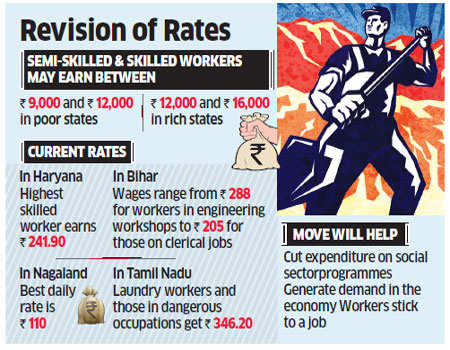The government may raise the minimum wages in the country by as much as 25% and also make them binding on all states, a move aimed at improving the lifestyle of the poor and giving an indirect boost to the rural economy.
A senior government official told ET that the labour ministry is considering three groups for states and union territories based on the per capita income and minimum wages for the unskilled, semi-skilled and skilled category of workers in each of the provinces.
The ministry recently increased the National Floor Level Minimum Wage to Rs 160 per day from Rs 137, with effect from July. This translates into a monthly salary of Rs 4,800 for an unskilled worker, but is only advisory and is not mandatory for states to follow. As a result, wages are very low in some states leading to unrest among workers.
 According to the official, who spoke on the condition of anonymity, the classification and the changes to make the wage levels binding on states would require amendment to the Minimum Wage Act, 1948. "We are working on a formula to arrive at minimum wages for unskilled workers. This could go up to one-and-half times in semi-skilled category and may be two times for skilled workers in that state," the official said, adding that the wages would be revised at regular intervals.
According to the official, who spoke on the condition of anonymity, the classification and the changes to make the wage levels binding on states would require amendment to the Minimum Wage Act, 1948. "We are working on a formula to arrive at minimum wages for unskilled workers. This could go up to one-and-half times in semi-skilled category and may be two times for skilled workers in that state," the official said, adding that the wages would be revised at regular intervals.
A back of the envelope calculation suggest that states like Goa, Delhi, Sikkim, Chandigarh, Pondicherry and Maharashtra, with highest per capita income in the country, would be the first category where minimum wage for the unskilled would be in the range of Rs 8,000 - Rs 9,000.
For states like Bihar, Uttar Pradesh, Manipur, Assam and Jharkhand, with least per capita income, the minimum wage could be around Rs 6,000 a month, an increase of 25% based on the recently raised National Floor Level Minimum Wage. Going by this, minimum wages would range between Rs 9,000 and Rs 12,000 for semi-skilled and skilled workers in poor states and between Rs 12,000 and Rs 16,000 in rich states. The Centre hopes revising the wage rate will help the government, as the step will give room to cut expenditure on social sector programmes and generate demand in the economy. It could also help ensure that workers stick to a job and not switch over in lieu of differential wages.
"Most importantly, unskilled workers may get motivated to move into semi-skilled and skilled category for a better lifestyle once the fixed wages are in place," the official added. The move may, however, not go down well with trade unions which have been demanding a minimum wage of Rs 15,000 a month, a level the government feels is unrealistic and could act as a deterrent for employers. Minimum daily wages vary widely from state to state: In Haryana, the wage for the highest skilled worker is Rs 241.90, while in Bihar, which supplies the largest number of migrant workers, wages range from Rs 288 for workers in engineering workshops to Rs 205 for those on clerical jobs.
In Nagaland, the best daily rate is Rs 110. In Tamil Nadu, laundry workers and those in dangerous occupations get Rs 346.20, but most others draw less than Rs 300.
Source :http://economictimes.indiatimes.com/
0 comments:
Post a Comment